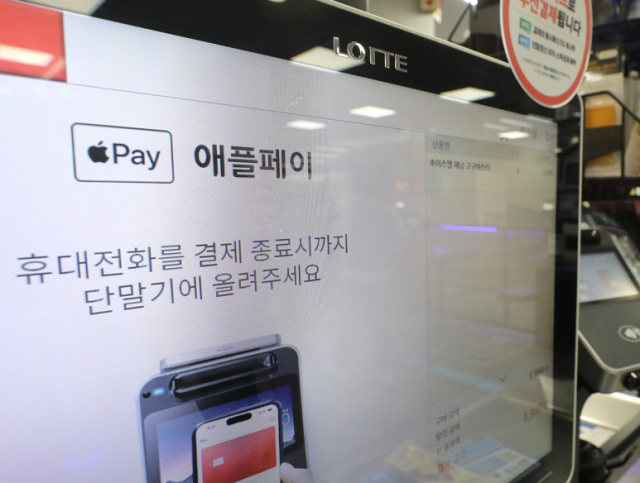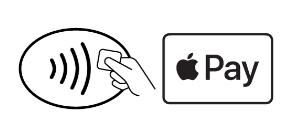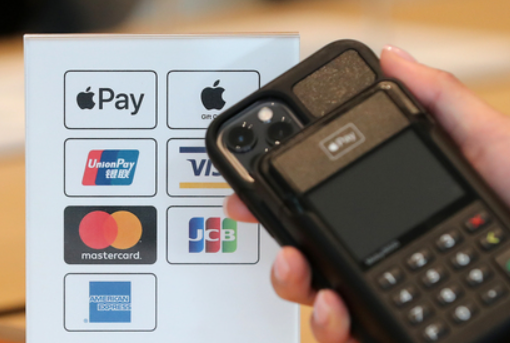Apple Pay, a simple payment service from Apple of the United States, will be available in Korea from the 21st. Apple Pay is Apple’s non-contact simple payment system, and it is a service that allows you to make payments at stores and restaurants without a wallet or physical card by storing card information on your iPhone or Apple Watch.
Models that can be used include △iPhone 6 and later models (online/offline) △Apple Watch 1 and later models (offline) △Macs released after 2012 (online) △Touch and Face ID enabled iPads (online).
 news 1
news 1In front of Apple Pay-enabled stores, Apple Pay contactless payment symbols are attached. The places where Apple Pay has been investigated so far are ▲ Lotte affiliates (Lotte Department Store, Lotte Shopping, Lotte Mart, Lotteria, etc.) ▲ SPC Group affiliates (Baskin Robbins, Paris Baguette, etc.) ▲ Homeplus ▲ Costco ▲ Twosome Place ▲ Angel-in-us ▲ Back Teahouses ▲ Ediya Coffee ▲ Mega Coffee ▲ Holly’s ▲ Paul Bassett ▲ major convenience stores (GS25, CU, 7-Eleven, E-Mart 24, Ministop) ▲ McDonald’s ▲ KFC ▲ Daiso ▲ Kyobo Book Center.
It cannot be used at Shinsegae Group stores such as Starbucks, E-Mart, and Shinsegae Department Store.
 In front of Apple Pay-enabled stores, Apple Pay’s contactless payment symbol is attached as shown in the picture. Capture from Apple’s official website
In front of Apple Pay-enabled stores, Apple Pay’s contactless payment symbol is attached as shown in the picture. Capture from Apple’s official websiteIn addition, since it is not affiliated with Cashbee and T-money, it seems that there will be limitations in using it as a prepaid transportation card.
The service can be used by storing the card in the iPhone’s wallet application (app). On the day of service launch, only Hyundai Card users can use Apple Pay. Initially, Hyundai Card gave up its monopoly on Apple Pay, but as of today, there are no additional affiliated card companies.
Counterpoint Research, a global market research firm, released a report on the impact of Apple Pay’s arrival in Korea on the 20th, and announced that Apple Pay would secure a 15% share in the domestic simple payment market by 2024.
According to a survey of 1,500 adult iPhone users last month by Consumer Insight, a research firm, 76.9% of the respondents said they were willing to use Apple Pay. It is more than 25% higher than the Samsung Pay usage rate of Galaxy users, which is around 50%.
Accordingly, with the landing of Apple Pay in Korea, Apple has started to expand public support for the iPhone 14 to expand its market share. SK Telecom raised the support for the Apple iPhone 14 series by more than 300,000 won to a maximum of 462,000 won. LG U+ has set up a public subsidy of up to 450,000 won.
 news 1
news 1Some predict that the impact of Apple Pay in Korea will be small. This is because of fees and the spread of payment terminals.
Until now, Apple Pay has charged affiliated banks and credit card companies with a certain amount of fee per transaction for using Apple Pay. It is currently known as 0.15% in the United States. Just like this, Apple earned 1.3 trillion won in fees from countries around the world last year.
It seems that Hyundai Card, which has become a partner, will have to pay an additional fee of about 1% to use the near field communication (NFC) payment standard and international standard EMV contactless payment technology.
Along with this, there is also a view that the penetration rate of NFC terminals can be a hindrance. Currently, the domestic NFC terminal penetration rate is only 10%, and each NFC terminal costs 100,000 to 150,000 won.
Meanwhile, Apple Pay’s domestic landing is 9 years after its first launch in 2014. Fee issues and low handset penetration have been a hindrance. Then, Hyundai Card and Apple officially landed in Korea on the 8th of last month, and the service was released on the 21st.
Source: Donga
Mark Jones is a world traveler and journalist for News Rebeat. With a curious mind and a love of adventure, Mark brings a unique perspective to the latest global events and provides in-depth and thought-provoking coverage of the world at large.